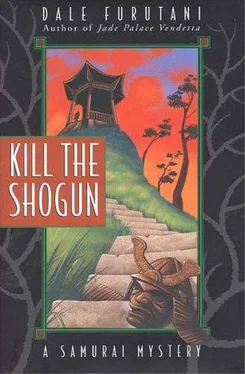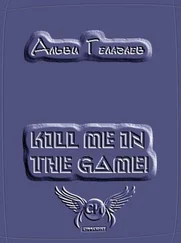Dale Furutani - Kill the Shogun
Здесь есть возможность читать онлайн «Dale Furutani - Kill the Shogun» весь текст электронной книги совершенно бесплатно (целиком полную версию без сокращений). В некоторых случаях можно слушать аудио, скачать через торрент в формате fb2 и присутствует краткое содержание. Год выпуска: 2011, ISBN: 2011, Жанр: Исторический детектив, на английском языке. Описание произведения, (предисловие) а так же отзывы посетителей доступны на портале библиотеки ЛибКат.
- Название:Kill the Shogun
- Автор:
- Жанр:
- Год:2011
- ISBN:0688158196
- Рейтинг книги:3 / 5. Голосов: 1
-
Избранное:Добавить в избранное
- Отзывы:
-
Ваша оценка:
- 60
- 1
- 2
- 3
- 4
- 5
Kill the Shogun: краткое содержание, описание и аннотация
Предлагаем к чтению аннотацию, описание, краткое содержание или предисловие (зависит от того, что написал сам автор книги «Kill the Shogun»). Если вы не нашли необходимую информацию о книге — напишите в комментариях, мы постараемся отыскать её.
Kill the Shogun — читать онлайн бесплатно полную книгу (весь текст) целиком
Ниже представлен текст книги, разбитый по страницам. Система сохранения места последней прочитанной страницы, позволяет с удобством читать онлайн бесплатно книгу «Kill the Shogun», без необходимости каждый раз заново искать на чём Вы остановились. Поставьте закладку, и сможете в любой момент перейти на страницу, на которой закончили чтение.
Интервал:
Закладка:
He cursed himself for using the Koga ninja, the same ninja the Tokugawas used. Although they kept their identities secret, they all came from the village of Koga. They were born into ninjutsu , the art of the ninja, and only left it when they left this life. Still, Toyama initially had no idea how to contact a ninja clan, and it was one of Tokugawa’s own retainers who helped him make the contact. It was only natural it would be the Koga, instead of one of the other ninja groups.
He rubbed his palms against his kimono. He was desperate to kill that man. It was obvious that Ieyasu-sama was not pleased with him, and something drastic had to be done to change the situation. Ieyasu-sama had already reduced, changed, or totally eliminated fiefs for other daimyo. Most of these were men who supported Hideyoshi’s heir, but some were part of the Tokugawa camp. They were men Ieyasu-sama didn’t trust or was displeased with. With the bulk of his army still intact after Sekigahara, it was unwise to defy the orders of the new Shogun.
“Damn!” Toyama said. “I want that man dead. It is the only way!”
CHAPTER 7
An evil nature
can reside in a small space.
An atrocious child.
One of Okubo’s earliest memories was of seeing a man boiled alive. His father had a special fondness for this type of punishment, and he prescribed it often for miscreants of all types. Okubo couldn’t remember the crime of the first man he saw boiled, but he did remember the event.
In the center of the courtyard of the Okubo villa, a large iron pot was placed. This kind of pot was normally used for cooking vegetable stew for large numbers of troops, but it served admirably for the purposes of Okubo’s father.
On the wooden veranda that encircled three sides of the courtyard, new t atami mats were placed. Okubo’s father sat on one of these mats, with his young son at his side. Okubo’s mother pronounced the proceedings “gruesome” and refused to attend the execution.
Okubo remembered that his father, who was a tall, normally phlegmatic man, was very animated and excited about the boiling. He was constantly leaping up to inspect or supervise some aspect of the execution. He directed his vassals as to how to arrange the logs around the pot and where to put the kindling. Then he sat on the tatami eating pickled radishes as he waited impatiently for the servants to bring bucket after bucket of water to fill up the pot.
When the condemned man was brought into the courtyard, Okubo’s father personally supervised tying him up before placing him in the pot. The prisoner was crying, and Okubo clearly remembered his father slapping the prisoner and telling him to be a man.
When he returned to the tatami, Okubo’s father explained to him some of the fine points of how the man was tied. Tying up prisoners was one of the skills learned by samurai, but these ties were meant to immobilize a prisoner, not keep him trussed up in a pot. Okubo especially remembered his father telling him not to loop a length of rope around the prisoner’s neck, because he might be able to use it to strangle himself and thereby cut short his misery.
Finally, when all was ready, Okubo’s father ordered the fire lit.
At first the man was relatively stoic, crying softly as the logs surrounding the pot gradually heated up the water within. By the end, the man was screaming for mercy and begging Okubo’s father to end his agony.
At the very end, one of the guards broke ranks and stepped forward with a spear, ready to thrust it into the prisoner to end his suffering. Angrily, Okubo’s father ordered the guard arrested before he could deliver the thrust of mercy. Okubo couldn’t remember what happened to that guard, but he supposed that the guard was himself boiled at a later date. What he did remember was that his father quite enjoyed himself, laughing out loud while the other witnesses to the execution all turned away.
Okubo’s father kept the man in the pot until his flesh started boiling off his bones. Young Okubo and his father sat on the veranda for the entire time this took. Then, when it was all over, Okubo’s father asked his heir if he enjoyed the spectacle. The young Okubo answered, “Hai! Yes!”
When Okubo was around nine, his father conducted a series of disastrous campaigns against his neighboring daimyo. Although he was outnumbered, the neighbor was just too good a general to be beaten by the Okubo clan, and Okubo’s father was forced to settle for peace under humiliating circumstances. Part of the peace agreement required the young heir to go to the enemy’s castle as a hostage for three years, to guarantee the Okubo clan’s good behavior.
So the young Okubo, then ten, was sent to the next fief. He took with him several servants and retainers so he could continue to live in spoiled comfort. He was officially an honored guest, but his entire clan knew his life would be forfeit if his father started another ill-fated adventure within three years.
What only he knew was that, on the night before he left, his father came to him in his room.
“I hate those people!” his father declared. “They think they’re more virtuous than us, even though our rank in the Imperial Court is much higher than theirs! I want you to know that since you are my heir, I will try to restrain myself, but someday the Okubos will have a chance to bring that family to ruin! If that day comes sometime within the next three years, I intend to act. I can always father another boy.” Then Okubo’s father left without a further word. The next morning, as Okubo and his entourage left for the next fief, his father did not appear to say farewell.
Despite his precarious position, the neighboring daimyo turned out to be quite kind and solicitous of Okubo’s welfare. Instead of responding to this kindness, the young Okubo felt bile in his soul, and for some reason his hatred and contempt of the neighboring clan grew to exceed even the hatred expressed by his father.
The neighboring fief seemed to be run more efficiently than Okubo’s own, even though the daimyo seemed so weak that he didn’t grind his vassals into the dirt. Instead, he treated them with respect, and they responded with loyalty and maximum efforts in peace or in war. Instead of embracing this model, the example only hardened the heart of the young Okubo. It made him want to embrace the autocratic ways of his father all the more.
One thing the young son missed was executions by boiling. When execution was required, the neighboring daimyo had it done swiftly, with a single stroke of a sword. Missing one of his favorite recreations, the young Okubo decided to rectify this.
He had three of his retainers find him a stray dog. They trussed up the poor animal, taking special care to tie up its muzzle. Then, behind the villa of the daimyo, Okubo had firewood and a pot of water brought. The dog was in a panic when Okubo had his retainers place the animal in the water. The dog thrashed about, causing the water to fly. Okubo himself lit the fire; then he stepped back to see the fun.
“What are you doing?”
Okubo looked over his shoulder to see the person who now called himself Matsuyama Kaze looking at him. Okubo’s body was shielding Kaze’s view of what was in the pot. The three Okubo retainers had stepped away when the young Okubo lit the fire, and none of them made a move to intercept the young Kaze.
Kaze was nine then, and in his youthful hands he held a paper kite and twine. Okubo ignored him. Kaze was the son of a mid-level samurai at the castle, and should not have even been addressing an heir and future daimyo like Okubo.
“I asked, what are you doing?”
Okubo was not used to being addressed in such a tone of voice, and he said irritably, “This is none of your business. Go off and play your stupid games!”
Читать дальшеИнтервал:
Закладка:
Похожие книги на «Kill the Shogun»
Представляем Вашему вниманию похожие книги на «Kill the Shogun» списком для выбора. Мы отобрали схожую по названию и смыслу литературу в надежде предоставить читателям больше вариантов отыскать новые, интересные, ещё непрочитанные произведения.
Обсуждение, отзывы о книге «Kill the Shogun» и просто собственные мнения читателей. Оставьте ваши комментарии, напишите, что Вы думаете о произведении, его смысле или главных героях. Укажите что конкретно понравилось, а что нет, и почему Вы так считаете.












